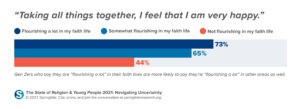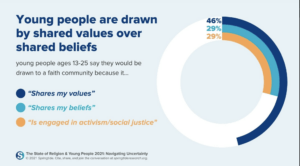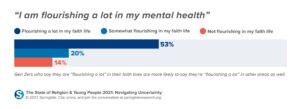Young people in the United States are fearful about the new year but are not turning to churches or other faith communities for solace or guidance, according to a research group that tracks the spiritual lives and perspectives of Generation Z.
“Six in 10 young people (63%) say they’re unsettled, uncomfortable or stressed because they don’t know what their life will be like in 2022,” Springtide Research Institute said in a Jan. 18 news release about young people ages 13 to 25.
But religious groups shouldn’t expect waves of young people darkening their doors for hope and answers, the researchers predicted. “We anticipate that few will turn to faith communities during this season of uncertainty. Only 19% told us in 2021 that connecting with a faith community has helped them cope during a challenging or difficult time.”
 And even when some young people embrace faith, others will abandon it, Springtide leaders said.
And even when some young people embrace faith, others will abandon it, Springtide leaders said.
In December 2021, 33% of Gen Z respondents told the organization they had become less religious, and the same amount said they had become more religious. About 34% said they had remained the same.
Springtide said it sees no reason to expect anything different going forward. “About the same number of young people will become more religious in 2022 as those who become less religious.”
In fact, the organization predicted little will change in the trends it captured in its 2021 survey, “The State of Religion and Young People 2021: Navigating Uncertainty.”
“The dominant trends from 2021 will continue,” Springtide Executive Director Josh Packard said. “COVID will disrupt lives and relationships, forcing young people to explore new and innovative ways to explore their religious and spiritual identities.”
 The dominant trends uncovered in Springtide’s 2021 survey included the tendency of young people generally to see a disconnect between themselves, their values and concerns and those of faith communities.
The dominant trends uncovered in Springtide’s 2021 survey included the tendency of young people generally to see a disconnect between themselves, their values and concerns and those of faith communities.
As a result, a majority “consider themselves at least slightly religious (71%) or spiritual (78%), but the majority aren’t turning to religious institutions in times of difficulty,” Packard explained.
The biggest divisions Gen Z respondents identified revolved around their strong support for LGBTQ rights, gender equality, Black Lives Matter, gun reform and other social issues — and their belief that churches do not share those concerns.
The widest gap between values and perception was on the matter of racial justice, with 81% saying they care about the issue and only 60% believing the church does.
Springtide noted this week that this area may be one where communities of faith could find a connection with Gen Z.
“When asked what would draw them to a faith community, 46% of young people said shared values, while only 29% said shared beliefs. We also discovered that young people are just as likely to be drawn to a faith community because they’re engaged in activism/social justice (29%) as they are shared beliefs (29%).”
But when young people find their way into a life of faith, the benefits are clear, Springtide said in its report. “In 2021, we discovered there is a positive relationship between a young person flourishing in their faith life and flourishing in their mental health.”
 The survey said 53% of those who reported a “flourishing” faith life also reported their mental health to be “flourishing a lot.” By contrast, only 20% with “somewhat flourishing” faith and 14% whose faith was “not flourishing” claimed mental health that was “flourishing a lot.”
The survey said 53% of those who reported a “flourishing” faith life also reported their mental health to be “flourishing a lot.” By contrast, only 20% with “somewhat flourishing” faith and 14% whose faith was “not flourishing” claimed mental health that was “flourishing a lot.”
“We also discovered there is a positive relationship between a young person flourishing in their faith life and their overall happiness,” Springtide reported.
The survey found that 73% of those with flourishing faith agreed that “taking all things together, I feel very happy.” The same was true for 65% who reported “somewhat flourishing” faith and for 44% of those without a flourishing faith.
Springtide added that those who claimed strong faith also reported doing well in other areas of their lives. “Across the board, young people who tell us they are religious also tell us they are flourishing at higher rates in every aspect of their well-being and relationships.”
But others are having a harder time of it, the researchers said.
“Young people are experiencing uncertainty right now about a range of events and realities they’re facing. They are coping by turning to trusted relationships. By and large, those relationships do not include faith leaders.”
Related articles:
Gen Z non-Christians pay most attention to those who live out their faith rather than preach it
Gen Z Christians more open to share their faith than Millennials
Millennial, Gen Z Christians support missions — with reservations


